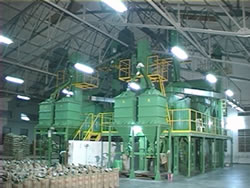SEED PROCESSING PLANT
Procedure for approval
Processing of seeds is done based on the one or more differing physical characters of seed (i.e.) seed size, length, weight, shape, surface texture, colour, affinity to liquid and electrical conductivity. In processing, first phase consists of scalping, debearding, hulling, shelling to make the seed flow readily through the grader and cleaner (conditioning and pre-cleaning).
The second phase includes the removal of inert material, weed seeds, other crop and broken seeds that are larger or smaller than the crop seed.
In the final (separating and upgrading) phase, undesirable materials are separated from the seed.
Processing machine
Models of some processing machines in use and their capacities are as follows:
- Ensco-super - 300 kg/hour
- Cripen model - 250-300 kg/hr
- Junior petkus - 500 Kg/hr
- Giant petkus -1000-1200Kg/hr
- Thermax - 1000Kg/hr
- Osaw - 800 Kg/hr
- Agrosaw - 500 Kg/hr
- Tucas - 300 Kg/hr
Approval of units
The following five types of seed processing units are approved by the Director of seed Certification to carry out the certification works.
1. Seed Processing and tagging unit
2. Ginning Unit
3. Ginning, processing and tagging Unit
4. Delinting Unit.
5. Cleaning and tagging unit.
Pre requisites for approval
1. Processing and tagging
A. It should have machinery for cleaning, grading, treating, weighing, bag closing and moisture testing.
B. It should have working space for storing raw seed and processed seed.
C. It should have adequate number of Dunnages, tarpaulins and drying yard.
D. It should be installed in a suitable Building with proper ventilation and natural light and facilities for artificial light. The ceiling, floor, side walls should be leak-proof and free from cracks and crevices.
E. It should be so designed that chances of seed quality deterioration is the least.
F. It should have the required sieves of different sizes.
2. Ginning unit

A. It should be installed in a suitable building with proper ventilation and natural light and facilities for artificial light. The ceiling, floor, side walls should be leak proof and free from cracks and crevices.
B. It should have sieving cots to Remove broken and undersized seeds.
C. It should have adequate drying yard to dry the seeds immediately after ginning.
D. It should have weighing balance.
E. It should have facility for pre-Cleaning the kapas.
3. Ginning, processing and Tagging Unit
In addition to the requirements for ginning unit mentioned above, the following items are necessary.
A. It should have required sieves to Grade the seeds, bag closer, weighing balance (smaller capacity) and moisture meter.
B. It should have working space to store raw seeds and processed seeds.
C. It should have drying and cleaning yards.
D. It should have adequate number of Dunnages and tarpaulins.
E. It may have machineries like grader, Specific gravity separator, and equipment for delinting etc.,
4. Delinting
A. It should be provided with required materials and machineries for carrying out delinting operation.
B. It should have enough space to store unprocessed seeds and delinted seeds.
C. It should have cleaning and drying yards.
5.Cleaning and Tagging
A. It should be in suitable building with Proper ventilation and natural light and facilities for artificial light. Ceiling, floor, and side walls should be leak proof and free from cracks and crevices.
B. It should have enough working Space for cleaning, storing and tagging.
C. It should have required sieves for Cleaning, bag closer, weighing balance (Smaller capacity) and adequate number of dunnages.
Delinting can also be done in any approved units provided that while applying for licence an indication for the same had been made.
The person who desires to get approval of his unit should send the application in quadruplicate in the prescribed proforma (Vide Annexure XXIII) to the Director of Seed Certification through proper channel along with prescribed fees.
The owner of the unit should maintain the following registers (as the case may be).
1. Processing and tagging register (Annexure XIII)
2. Tag Account Register (Annexure XVIII)
3. Ginning Unit Register
4. Delinting register
5. Stock Register
6. Instruction Book
Before recommending, the Seed Certification Officer should verify the unit for its minimum specifications and equipments required for a unit. If he is not satisfied, he should return the application to the owner with reason. If it is eligible for approval, the application should be submitted to the Assistant Director of Seed Certification with his recommendations.
On receipt of the application, the Assistant Director of Seed Certification should inspect the unit and recommend it to the Deputy Director of Seed Certification with his remarks. The Deputy Director of Seed Certification scrutinises the application and recommends the application for approval. In the case of fresh approval, the Deputy Director of Seed Certification must necessarily inspect the unit and submit the application with his remarks. The Assistant Director of Seed Certification and Deputy Director of Seed Certification should maintain unit approval register in the form prescribed (vide Annexure XXIV).
Renewal of SPU
Every approved seed processing unit holder, desiring to renew the approval shall before the date of expiry of the approval make an application for renewal in triplicate (Annexure XXV) to the Deputy Director of Seed Certification concerned through proper channel along with prescribed fees. If any application is not made before the expiry of the approval, but is made within a month from the date of expiry of approval, the approval may be renewed on payment of late fee for renewal of approval. But on any case the renewal application will not be accepted if it reaches ADSCN office after one month from the date of expiry. In such cases it may be considered for new licence.
|

